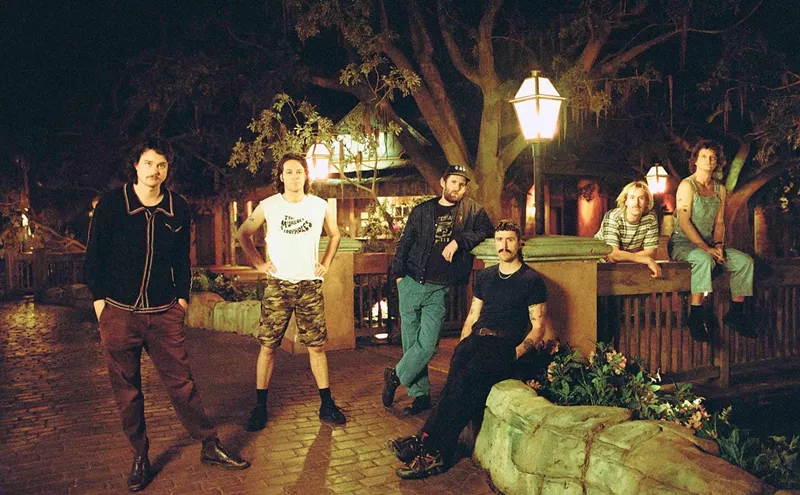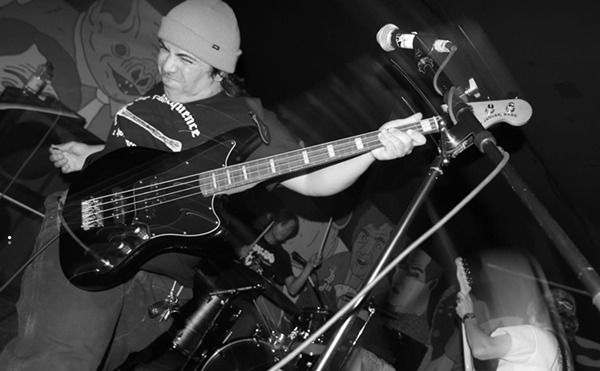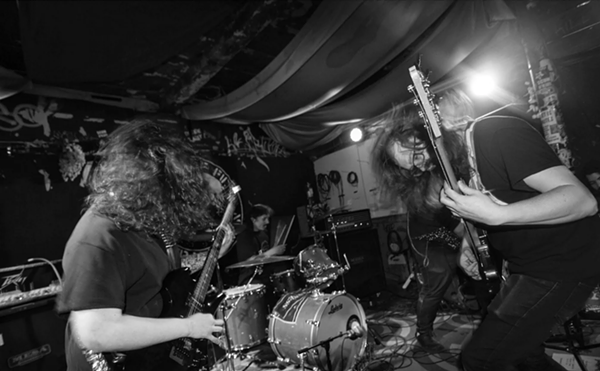Which brings us to Chad Hugo, who, in tandem with partner Pharrell Williams, has done as much as anyone to shape the sound of pop music in this country and beyond over the past several years. The two have achieved notable critical acclaim and better-than-decent sales as two-thirds of N.E.R.D., a group featuring rapper Sheldon Haley (aka Shay) that attempts to push beyond the usual hip-hop stereotypes. Yet they also make big chunks of their living as the Neptunes, a production team that's helped performers as varied as Mystikal and Justin Timberlake ascend the charts. Moreover, the pair recently branched out with Star Trak, a new label whose initial release, by the hardcore outfit known as the Clipse, was an out-of-the-box smash.
In essence, Hugo and Williams are a musical corporation whose success has been built upon a diversified slate of products. As Hugo puts it, "The system works."
To keep the assembly line humming along efficiently takes planning Henry Ford could appreciate. For instance, N.E.R.D. is currently headlining a tour at the same time Star Trak is readying the release of The Neptunes Present . . .Clones, a CD that promotes signees like Kelis and Rosco P. Coldchain even as it attempts to establish Williams as a star in his own right; he's paired with Jay-Z on the lead single, "Frontin'," which is already a hit. In the meantime, a new N.E.R.D. disc is moving forward, and in order to have it completed and ready for delivery in early 2004, when the Neptunes album will presumably have run its course, Hugo has had to prioritize his responsibilities.
"Right now, I'm finishing the N.E.R.D. album, and I'm working on Neptunes stuff, so I don't think I'll be able to play on the tour," he allows. "I feel bad saying that, but I probably won't."
Crowds are unlikely to riot over Hugo's absence, due mainly to his low profile in comparison with that of Williams, who's lately been slicing off more of the spotlight for himself. In addition to the face time he receives in the "Frontin'" video, Williams plays a prominent role in "Beautiful," a recent Snoop Dogg salvo.
A sleek and handsome African-American with an effective vocal approach, Williams looks the part of a hip-hop frontman much more than does Hugo, who's of Filipino descent and plays old-school keyboards and guitars in addition to occasionally manning the wheels of steel. Hugo isn't actively rebelling against his background status, however; he appears to care more about making music than taking bows.
"There's a lot of technical shit that nobody really knows about, and maybe that should be presented," he says. "If someone took a camera and went into the studio and wanted to see how it's done, by all means, film it. I'm there. But people don't ever really see behind the scenes. MTV has Making the Video, but you normally don't see Making the Song.
"I deserve my credit, damn it," he continues, laughing, "but that's not the main thing. The main thing is to do whatever it takes to get out a good song."
This philosophy grew out of a musical association that began before either Hugo or Williams needed to shave regularly. They both came of age in the vicinity of Virginia Beach, Virginia, meeting in a seventh-grade music program that they disliked equally. Soon they were spending their free time building primitive beats or performing in such ephemeral groups as the vividly monikered Surrounded by Idiots; one of their fellow bandmembers was Timbaland (born Tim Mosley), arguably the Neptunes' only real competition for the title of 21st-century über-producer. Shay, too, performed with the duo, circa their high school years, around the period of their Lana Turner-like discovery by Teddy Riley, a production pioneer in his own right; he's credited with developing the late-'80s/early-'90s R&B movement dubbed "new-jack swing." Riley's base of operations, Future Recording Studios, was within spitting distance from the high school, and after catching Hugo and Williams at a 1992 talent show, he signed them up.
Instant celebrity didn't follow. Instead, the cohorts were groomed by Riley to work at shaping the sounds of others. Williams helped engineer part of It's About Time, a 1992 platter by the vocal combo SWV; Hugo served as assistant producer, associate producer and saxophonist on 1994's Blackstreet, the self-titled offering by a collective led by Riley. (Hugo's sax also graces Jay-Z's 1997 opus In My Lifetime, Vol. 1, among other big sellers.) Two years later, on the 1996 SWV package New Beginning, Hugo and Williams graduated to full producer ranking, leading to subsequent gigs for MC Lyte and Mase. But they truly hit their stride as the decade was drawing to a close. Ever since they contributed to the wonderfully bizarre Ol' Dirty Bastard benchmark Nigga Please, issued in 1999, they've been on an incredible run. Their clients have included Ice Cube, Destiny's Child, Busta Rhymes, Guru, Ja Rule, Alicia Keys, Paul Oakenfold, No Doubt, Scarface, TLC, Ludacris and Nelly, whose inescapable "Hot in Herre" reached the stratosphere with a big assist from the Neptunes. Hugo and Williams are credited as songwriters on "Herre," undoubtedly to the delight of their accountants.
With such a range of customers, the Neptunes have taken a variety of tacks to satisfy individual needs. "There's little formulas that may work here and there," Hugo says, "but it's not like we're going to stick to something and never evolve. We are evolving right now, as we speak."
Nonetheless, they frequently return to specific approaches -- most notably the stripped-to-the-bone technique heard on the Clipse's "Grindin'," the hip-hop answer to "We Will Rock You." Says Hugo: "Less is more a lot of times, because you're exposing the true characteristics of the artists. There are some times where we don't even add anything to the music -- where I may actually take things out to accentuate what the artist is saying or kind of draw the listener into certain elements of the song instead of making the listener listen to all those elements at the same time.
"We don't do that all the time, though," he stresses. "These days, we're doing some things where more is more."
Their working methods are just as varied. "There are times when Pharrell and I will work together and come up with ideas, chords, and then he'll turn them into songs," Hugo points out. "And there are times when Pharrell will come up with a beat and record it himself; he'll do, like, a scratch hook for an artist, and then he'll present it to me, and I'll add stuff on top. At times like that, my role is like a band musician who'll come and play around the artist after they've done their hooks. Or I'll play some chords and Pharrell will like them and start singing some stuff along with it. So we kind of switch roles all the time, without ever thinking about it."
Likewise, he says he gives little thought to allegations that the Neptunes dilute their credibility for cash when collaborating with the likes of Britney Spears and 'N Sync. (They wrote and produced Spears's "I'm a Slave 4 U" and penned 'N Sync's "Girlfriend" with Timberlake, who is matched up with Nelly in the Neptunes' mix of the song.) Still, his tone suggests that these gripes irritate him.
"We can do what we want, do what we feel," he maintains. "I respect Justin's work and Britney's work. We just want to make music and reach out to different types of people. We'll always be critiqued, so it's up to us to change our sound and do different things. And as long as people are listening to it and dancing to it, I can't complain."
Hugo has less need to get defensive in regard to N.E.R.D., an acronym for "No One Ever Really Dies," which he insists on spelling out one letter at a time. In Search of . . . , released in 2001, attracted primarily positive notices, despite (or perhaps because of) the series of risks Williams and Hugo took while constructing it. They largely eschewed sampling in favor of live instrumentation provided by the band Spymob, and emphasized their eclecticism by tossing together disparate genres: "Lapdance" isn't that far removed from rap-rock; "Provider" has a folk-soul feel, and so on.
That the results didn't have much in common with past Neptunes productions was by design, according to Hugo. "There's a lot of good ideas that we just kind of store within ourselves and save for some other shit," he says. "Why pour everything out when you can say a lot more? We've got a lot of music to give, but we don't want to give it all away at the same time.
"N.E.R.D. is a good outlet for us, because it lets us express ourselves even more. We're not really doing it for A&R or what other artists are looking for. We're doing it for ourselves, so it lets us do things musically that might not make sense to the radio format. That way, there are no limits when it comes to N.E.R.D."
Even so, Hugo and Williams want N.E.R.D. to be heard, not just admired. Last year, In Search Of . . . won the Shortlist Prize for Artistic Achievement in Music after being chosen by a panel of fellow musicians over discs by the Hives and DJ Shadow, among others. Yet Williams, in his acceptance speech, spent much of his energy ripping Virgin Records for not adequately pimping the CD. (Williams's words may help explain why Star Trak is being distributed by Arista Records, not Virgin.)
Of course, In Search of . . . was hardly a bust; it went gold, with sales of over 500,000 units. And even if the album had sunk, N.E.R.D. would likely have been given a second chance (and a third -- and a fourth), if only to keep the Neptunes happy. "I do think the Neptunes helped pave the path for N.E.R.D.," Hugo acknowledges.
So Hugo and Williams aren't letting commercial considerations color N.E.R.D.'s sophomore outing. "I really don't want to label it," Hugo says, when asked for a preview, "but it has a lot of '60s rock influences -- a little bit of the Beatles/Rolling Stones feel. It's like grunge mixed with hip-hop beats."
If the combination works, it could allow these gifted entrepreneurs to branch out to entirely new markets, thereby expanding their brand even further. And that's smart business.












